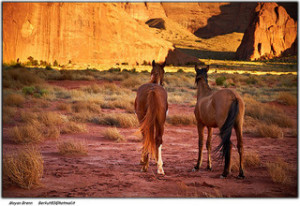 The National Horse Slaughter Ban of 2006 was essentially instituted after The Agriculture, Rural Development, Food and Drug Administration, and Related Agencies Appropriations Act of 2005-2006 was signed into law. This law included a clause that removed funding for the inspection of horse slaughterhouses, closing the slaughter houses and the practices all together.
The National Horse Slaughter Ban of 2006 was essentially instituted after The Agriculture, Rural Development, Food and Drug Administration, and Related Agencies Appropriations Act of 2005-2006 was signed into law. This law included a clause that removed funding for the inspection of horse slaughterhouses, closing the slaughter houses and the practices all together.
The ban was lifted in 2011 when permits were issued by the Department of Agriculture to construct horse slaughterhouses, renewing the debate and the controversy. After careful analysis, I contend that the national horse slaughter ban of 2006 should be repealed, and here are the three reasons why:
There's No Good Reason to Exempt Horses, but Not Pigs, Cattle, Chickens Etc.
If you're going to be against the horse slaughter, then you have to be against cow slaughter, chicken slaughter, pig slaughter etc. There are many practices that would be part of horse slaughter, but are also already part of the slaughter of other animals, even though those practices aren't receiving the same attention. The problems of factory farms and animal slaughter have been documented many times over by a variety of credible sources, yet the issue is still relegated as something only those radical vegans and animal-rights activists care about. Yet, somehow, horse slaughter is a much more mainstream issue and horses are much more deserving than pigs, cattle, chickens, ducks etc. of humane treatment and of avoiding the processes that are a part of turning animals into food products.
“Horse slaughter has no place in our culture,” Redford said in a statement last week to the Associated Press in announcing formation of a foundation that has joined the fight. “It is cruel, inhumane, and perpetuates abuse and neglect of these beloved animals. We must oppose it with all of our might. We need to ensure horses have safe and kind treatment during their lives and are afforded the peaceful and dignified end they deserve.”
Although Redford's stance is admirable, there's nothing distinctive about it that shows why horses don't deserve cruel, inhuman abuse and neglect but other animals do. Redford's statement could be applied to any other animal and still hold up as logical and compassionate. Pigs, cattle, chickens etc. also go to slaughterhouses for the preparation of human consumption. It would also seem that everything would be fine if horses were bred, from birth, for human consumption and not as a companion animal. I have a tough time seeing how that treatment is humane and okay for those animals, but not for horses. It's either cruel and inhumane for all animals or no animals at all.
Companion Animals Face Early Death Also
Part of those who support the repeal are Native American tribes who need help controlling their horse populations. The Navajo and Yakama nations said in USA Today that the exploding horse populations on their reservations "are trampling and overgrazing rangelands, decimating forage resources for cattle and causing widespread environmental damage." Although an out-of-control horse population poses unique threats to the land, the idea of population control is applied to companion animals such as cats and dogs. The Humane Society notes that 2.7 million healthy cats and dogs are euthanized every year at shelters simply because they haven't been adopted and they no longer have the room for them.
No, those animals aren't being sent to slaughterhouses for possible human consumption, but the idea that there should be a ban on horses because we don't want horses to die before their time or because they are companion animals isn't all the strong. This is especially since cats and dogs don't have this same fervor. It is also presumed that if the horses were euthanized instead of sent to slaughterhouses, then everything would be fine. Once again, it comes down to the reasoning behind exempting horses but not other animals. If cats and dogs are forcefully put down as part of population control, then why is that practice okay for them but not for horses? Either do it for all or do it for none.
Laws Can Be Put in Place to Assuage Other Concerns
One of the major arguments against repealing the ban is the use of over 100 medications in horses that aren't fit for human consumption. These medications are unregulated, toxic to humans, and aren't used with other feed animals. However, this concern can be assuaged in two ways: instituting laws and regulations on those medications, and/or begin breeding and raising horses specifically for human consumption. Repealing this ban and constructing these horse slaughterhouses isn't going to happen overnight, so there is time to address concerns such as these medications. There's also no law or mandate that says that the horses that are slaughtered have to be used for human consumption in the United States. If the meat is used toward zoo feed, for example, then the concern about these medications and human consumption is mute.
In conclusion, I couldn't find a good reason to justify a slaughter ban on horses that shows why horses are more special or precious than the other animals that are slaughtered every day. I don't understand why slaughtering the other animals is perfectly fine, and doesn't merit the same outcry, especially when many of the same conditions that apply to these animals would also apply to the horses.
